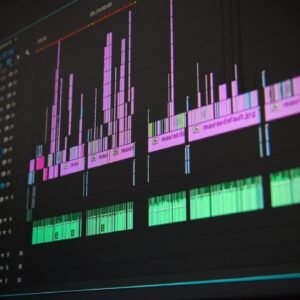Do you know what the first music was? It’s hard to say for certain, but researchers believe that music originated with early humans’ attempts to communicate with one another. Over time, this communication developed into a form of expression that we now call music. Whether it was the first drumbeat or the first song ever sung, we’ll never really know. But one thing is for sure – music has been an important part of human culture from the very beginning.
There are many different opinions on what the first music was. Some people say it was spoken language, while others believe that musical instruments were first used to create melodies. What does the evidence say about this topic? In this blog post, we will explore the history of music and discuss some of the earliest forms that it took. We will also consider how technology has changed the way we create and consume music today. Stay tuned – it’s going to be a history lesson like no other!
The first music was likely created by early humans banging rocks together
The first instruments were likely created by early humans banging rocks together. These early instruments would have been very simple, like a rock that was hit against another rock to create a sound. Over time, early humans began to experiment with different ways of creating music and developing new instruments.
One of the earliest known musical instruments is the flute. The flute is a simple instrument that is made by blowing air through a hole in a piece of wood or bone. The flute has been found in many different cultures around the world, suggesting that it is a very ancient instrument.
The first written music dates back to around 1400 BC. This early music was written using symbols that represented different pitches. This allowed for melodies to be written down and passed on from generation to generation.
Music has been used in religious ceremonies for centuries
Some believe that music may have even been used in religious ceremonies dating back to prehistoric times. The power and beauty of music is undeniable, and it’s easy to see why so many people throughout history have used it as a way to connect with the divine.
Today, music is still an important part of many religious ceremonies and rituals. Whether it’s being used to praise God, invoke spirit or simply create a sense of community, music plays an important role in religious life.
In fact, musical worship is one of the oldest forms of religious expression. The power of music to evoke emotion and create atmosphere is undeniable, which is why it continues to be such an important part of religious ceremonies today.
Whether it’s the soulful sounds of a gospel choir or the stirring strains of a hymn, music can touch us in a way that words alone cannot. It can lift our spirits and bring us closer to God.
Today, music is enjoyed by people of all ages and cultures
Whether it’s used for entertainment, relaxation or just to get people moving, there’s no denying the impact music has on our lives.
Humans have been making and listening to music for thousands of years, and it’s thought that even our ancient ancestors may have had some form of musical expression. Although we can’t be sure exactly how they made music, we do know that it was an important part of their lives.
Today, music is enjoyed by people of all ages and cultures. Whether it’s used for entertainment, relaxation or just to get people moving, there’s no denying the impact music has on our lives.
For some people, music is an important part of their identity. It can help us express ourselves and connect with others who share our taste in music. It can also be a great way to relieve stress and boost our mood.
No matter how you enjoy music, it’s clear that it has a huge impact on our lives. So why not take some time to listen to your favourite tunes today? You might just find that it makes your day a little bit better.
There are many cultures around the world that love music. Some examples include:
-The United States: Music is a big part of American culture, with genres like rock, pop, hip hop, and country being some of the most popular.
-Australia: Australians have a strong passion for music, with a healthy mix of local and international artists being popular.
-Canada: Canadians have a deep love for music, with many different genres being enjoyed by people of all ages.
-Germany: Germans have a rich history of music, with classical, jazz, and electronic music being very popular.
-Brazil: Brazil is home to a wide variety of music, from popular genres like samba and Bossa Nova to more traditional styles.
-South Africa: South Africans have a strong tradition of music, with many different genres being enjoyed by people of all ages.
There are all sorts of cultures that love music! From the traditional Western classical music culture, to more modern day rock and roll or pop music cultures, there is a music genre and style for everyone to enjoy. In recent years, electronic dance music (EDM) has become one of the most popular genres in the world, with fans of all ages and from all walks of life. No matter what your taste in music is, there is sure to be a culture out there that shares your passion!
There are many different types of music enjoyed by people of all ages. Some popular examples include pop, rock, classical, and country. No matter what your taste in music is, there is likely a genre or artist that you enjoy. Music can be a great way to relax, unwind, and escape from the everyday stresses of life. It can also be a great way to get pumped up and energized for a workout or party. No matter what your mood, there is probably a song out there that can match it. So crank up the volume and enjoy!
Music can be used to express emotions and tell stories
Music has been around for centuries, and it is one of the most universally enjoyed forms of art. It can be used to express emotions, tell stories, and even just to have fun. There are countless different genres of music, so there is something out there for everyone to enjoy.
Music has the ability to express a wide range of emotions. It can be used to express happiness, sadness, anger, love, and many other emotions. Music can also be used to create an atmosphere or mood. For example, fast-paced music can create a feeling of excitement, while slow-paced music can create a feeling of relaxation. Music is a powerful tool that can be used to influence the emotions of those who listen to it.
Music has the ability to transport us to different places and times. It can make us feel happy, sad, nostalgic, excited, or any other emotion. And sometimes, it can even tell a story.
There are many songs out there that have interesting stories behind them. Here are just a few examples:
1. “The Weight” by The Band
This song is about a man who is traveling through the town of Nazareth, where Jesus Christ was born. He stops at a place called the carpentry shop and asks to see Joseph. Joseph isn’t there, but his wife Mary is. The man then proceeds to tell her about his life and all the places he’s been.
2. “American Pie” by Don McLean
This song is about the day that Kennedy was assassinated. It talks about how that event changed America and how it will never be the same.
3. “Bohemian Rhapsody” by Queen
This song is about a man who has been accused of murder. He is pleading his innocence and telling his story to the court.
4. “Stairway to Heaven” by Led Zeppelin
This song is about a woman who is trying to find her way in life. She starts off at the bottom, but eventually makes her way to the top.
5. “Hotel California” by The Eagles
This song is about a man who checks into a hotel and finds that he can’t leave. He’s stuck there forever, and the only thing he can do is party.
Music can be calming or energizing
Some people prefer to listen to music that is fast-paced and energizing, while others find that slower, more relaxing music helps them focus. There are many different types of music out there, so it’s important to find the right kind for you. If you’re not sure where to start, try exploring different genres and artists to see what you like.
Listening to music can be a great way to improve your focus and concentration. If you’re having trouble getting started on a task, try putting on some of your favorite tunes. Music can also help you stay motivated and inspired while you’re working. Whether you’re writing a paper or painting a picture, listening to the right music can help you get into a creative flow.
If you’re looking for some new music to try, here are a few genres and artists that are known for helping people focus:
-Classical music: Bach, Beethoven, Mozart, Strauss
-Ambient music: Brian Eno, Hammock, Marconi Union
-Jazz: Miles Davis, John Coltrane, Thelonious Monk
-Electronic music: Aphex Twin, Boards of Canada, Kraftwerk
-World music: Nitin Sawhney, Yann Tiersen, Omar Sosa
-Pop: Katy Perry, Bruno Mars, Taylor Swift
There are many different types of music, each with its own unique sound
Music can be created for different purposes, including artistic expression, religious ceremonies, and entertainment. Music is an important part of our lives and can have a profound effect on our emotions.
Music is composed and performed for many purposes, ranging from aesthetic pleasure, religious or ceremonial purposes, or as an entertainment product for the marketplace. When music washes over us, it can bring joy or sorrow, and sometimes both at the same time. It can lift our spirits or calm our minds. Music has the ability to change our mood, and even influence our thoughts and actions.
Some researchers believe that music has a direct effect on the brain and nervous system, and that it can be used to treat various physical and mental conditions. Music therapy is an established field of medicine, and there is growing evidence that it can be helpful for a wide range of problems, including pain management, stress relief, anxiety reduction, and even improving cognitive function.
In general, music seems to have a positive effect on our moods and emotions. It can provide a sense of connection and community, help us to cope with difficult situations, and promote creativity. Whether you enjoy listening to music, playing an instrument, or creating your own compositions, there are many ways to incorporate music into your life and reap the benefits.
The first music might have been created by early humans banging rocks together. This is still a topic of debate, however, and further research is needed to determine the true origins of music.
Have you ever wondered what the first music was? Anthropologists believe that the first music may have been created by early humans banging on rocks and logs. This primitive form of percussion is thought to have originated as a way for our ancestors to communicate and express themselves. Share your thoughts about this topic in the comments below, or let us know more about it here. We’d love to hear from you!





